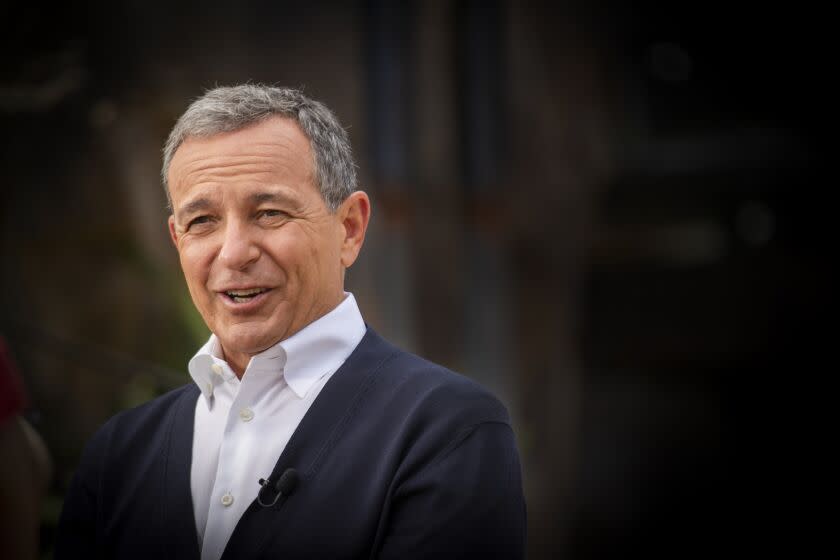Iger says he won't sell Disney to Apple in his first town hall after CEO shake-up
The Walt Disney Co.'s returning Chief Executive Bob Iger threw cold water on the idea of selling the company to Apple — or acquiring other major companies — during his highly anticipated Monday town hall for employees, according to attendees who were not authorized to comment.
During a Q&A session with "ABC7 Eyewitness News" co-anchor Leslie Sykes, Iger also stressed the need to make Disney+ profitable and signaled that cost-management measures, including a hiring freeze and travel restrictions, would remain in place — even though they were started by his ousted predecessor, Bob Chapek.
He also addressed the controversy over Florida's so-called "Don't Say Gay" law and the planned relocation of 2,000 employees to the Sunshine State.
The meeting came just over a week after Disney's board suddenly fired Chapek on a Sunday night and replaced him with Iger, who had previously served as CEO for 15 years.
Chapek was Iger's handpicked successor, but a number of high-profile missteps and a troubling earnings report contributed to Chapek's exit, just a few months after the board gave him a three-year contract extension.
On Twitter, Iger struck a modest celebratory note, posting a photo of the Michael D. Eisner Building and the Disney Legends Plaza with the caption "Filled with gratitude and excitement to be back @WaltDisneyCo!"
Ahead of the highly anticipated town hall, Iger shook hands with division heads at the company and smiled at employees while pop covers of Disney classics, including "Once Upon a Dream," played in the background.
He kicked off his remarks by referencing lyrics from an apt "Hamilton" tune: "What'd I Miss?" ("There is no more status quo," sings Daveed Diggs as Thomas Jefferson. "But the sun comes up and the world still spins.")
“That’s how I feel here," Iger said. "The status quo is gone. A lot has changed, but the sun is still shining, and our world and our Disney world is still spinning."
Among Iger's key points: Disney is powerful enough to compete on its own. He pooh-poohed speculation that has already cropped up about the possibility of selling Disney to a tech giant like Apple. Such a move would end Disney's history as a standalone entertainment company. But Iger long had close ties with Apple and its late co-founder, Steve Jobs, who launched Pixar before Disney acquired it.
"What you’ve read about in that regard is just pure speculation,” Iger said.
He also downplayed the idea of pursuing more acquisitions — like the ones he orchestrated for Pixar, Marvel, Lucasfilm and 21st Century Fox — saying he thought the company's collection of brands was strong enough already.
At the same time, Iger acknowledged that Wall Street is no longer satisfied with mere subscriber growth at the company's streaming service, Disney+, which had been the focus of investors and analysts when Iger stepped down in early 2020.
Disney's stock has dropped about 40% since January. During the fourth fiscal quarter, Disney's streaming business lost $1.5 billion, even as Disney+ gained 12 million subscribers to reach a total of 164 million. Disney’s stock fell 3% to $95.69 in Monday trading.
Iger noted that investors now want streaming to be profitable and that it's the company's responsibility to deliver value to shareholders. In terms of the content Disney produces, Iger returned to his emphasis of quality over quantity.
Iger has wasted no time making waves at Disney. Last week, he ordered a restructuring of the company to undo the way Chapek had reorganized the business. Chapek split content decisions from distribution strategy — severing decisions over what gets made from how it gets seen. As a result, the head of the distribution group, Kareem Daniel, was fired.
On the hiring freeze, Iger suggested that it was early days but that such measures made sense to control costs.
"It felt like it was a wise thing to do in terms of the challenges, and at the moment, I don’t have any plans to change it," he said.
Iger is expected to stay at the company for two years, during which time he's expected to groom his replacement.
This story originally appeared in Los Angeles Times.
Source: Read Full Article
